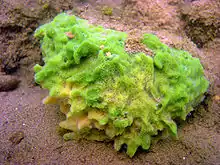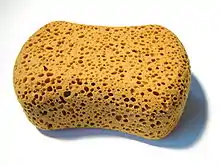esponja
See also: esponjá
Catalan
Etymology 1
From Latin spongia, from Ancient Greek σπογγιά (spongiá).
Etymology 2
See the etymology of the corresponding lemma form.
Portuguese

esponja (Spongilla lacustris)

esponja
Etymology
From Latin spongia, from Ancient Greek σπογγιά (spongiá), a later form of σπόγγος (spóngos, “sponge”) (compare Latin fungus).
Pronunciation
- (Brazil) IPA(key): /isˈpõ.ʒɐ/, /esˈpõ.ʒɐ/
- (Rio de Janeiro) IPA(key): /iʃˈpõ.ʒɐ/, /eʃˈpõ.ʒɐ/
- (Southern Brazil) IPA(key): /esˈpõ.ʒa/
- (Portugal) IPA(key): /(i)ʃˈpõ.ʒɐ/
- Hyphenation: es‧pon‧ja
Noun
esponja f (plural esponjas)
Descendants
- Hunsrik: Esponja
Spanish
Etymology
Semi-learned descendant of Latin spongia, from Ancient Greek σπογγιά (spongiá)[1], a later form of σπόγγος (spóngos) "sponge" (compare Latin fungus). Probably a doublet of espundia. Cognate with English sponge.
Pronunciation
- IPA(key): /esˈponxa/ [esˈpõŋ.xa]
- Rhymes: -onxa
- Syllabification: es‧pon‧ja
Noun
esponja f (plural esponjas)
Verb
esponja
- inflection of esponjar:
- third-person singular present indicative
- second-person singular imperative
References
- Joan Coromines; José A. Pascual (1983–1991) Diccionario crítico etimológico castellano e hispánico (in Spanish), Madrid: Gredos
Further reading
- “esponja”, in Diccionario de la lengua española, Vigésima tercera edición, Real Academia Española, 2014
Anagrams
This article is issued from Wiktionary. The text is licensed under Creative Commons - Attribution - Sharealike. Additional terms may apply for the media files.